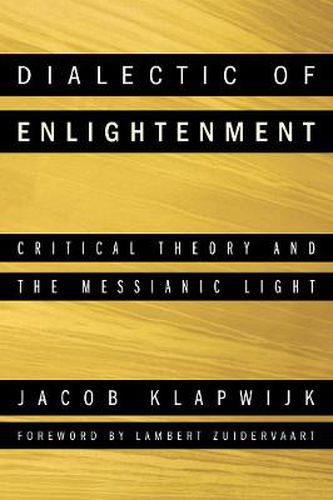Readings Newsletter
Become a Readings Member to make your shopping experience even easier.
Sign in or sign up for free!
You’re not far away from qualifying for FREE standard shipping within Australia
You’ve qualified for FREE standard shipping within Australia
The cart is loading…






This title is printed to order. This book may have been self-published. If so, we cannot guarantee the quality of the content. In the main most books will have gone through the editing process however some may not. We therefore suggest that you be aware of this before ordering this book. If in doubt check either the author or publisher’s details as we are unable to accept any returns unless they are faulty. Please contact us if you have any questions.
Dialectic of Enlightenment is a thought-provoking introduction to the Frankfurt School of Critical Theory. Max Horkheimer and Theodor Adorno first identified the dialectic of enlightenment when fascism was on the rampage in Europe. They warned that enlightened reason and societal freedom threaten to revert into blindness and oppression. Herbert Marcuse and the young Jurgen Habermas elaborated their Critical Theory, declaring that post-war society has not escaped this dilemma, blinded as it is by ideology, pseudo-democracy, and mass manipulation. Critical Theory aims to unmask modern reason and liberate society. But a fundamental question keeps coming back: how can this critique of modernity remain viable within a repressive societal system? Is reason in the modern world indeed doomed to self-destruct? Does rationality inevitably lead to domination and oppression? Jacob Klapwijk argues that the dialectic of enlightenment proves to be a faith, a mythical faith encouraging resignation and despair. Instead we need a wholesome reason, one inspired by a messianic faith. Dialectic of Enlightenment is an important book for students of philosophy, theology, and the social sciences. It invites them to a renewed criticism of the mythological traits and self-destructive tendencies of modern reason. It also offers a perspective of hope to all who share the author’s concern about the direction of today’s globalizing world.
$9.00 standard shipping within Australia
FREE standard shipping within Australia for orders over $100.00
Express & International shipping calculated at checkout
Stock availability can be subject to change without notice. We recommend calling the shop or contacting our online team to check availability of low stock items. Please see our Shopping Online page for more details.
This title is printed to order. This book may have been self-published. If so, we cannot guarantee the quality of the content. In the main most books will have gone through the editing process however some may not. We therefore suggest that you be aware of this before ordering this book. If in doubt check either the author or publisher’s details as we are unable to accept any returns unless they are faulty. Please contact us if you have any questions.
Dialectic of Enlightenment is a thought-provoking introduction to the Frankfurt School of Critical Theory. Max Horkheimer and Theodor Adorno first identified the dialectic of enlightenment when fascism was on the rampage in Europe. They warned that enlightened reason and societal freedom threaten to revert into blindness and oppression. Herbert Marcuse and the young Jurgen Habermas elaborated their Critical Theory, declaring that post-war society has not escaped this dilemma, blinded as it is by ideology, pseudo-democracy, and mass manipulation. Critical Theory aims to unmask modern reason and liberate society. But a fundamental question keeps coming back: how can this critique of modernity remain viable within a repressive societal system? Is reason in the modern world indeed doomed to self-destruct? Does rationality inevitably lead to domination and oppression? Jacob Klapwijk argues that the dialectic of enlightenment proves to be a faith, a mythical faith encouraging resignation and despair. Instead we need a wholesome reason, one inspired by a messianic faith. Dialectic of Enlightenment is an important book for students of philosophy, theology, and the social sciences. It invites them to a renewed criticism of the mythological traits and self-destructive tendencies of modern reason. It also offers a perspective of hope to all who share the author’s concern about the direction of today’s globalizing world.